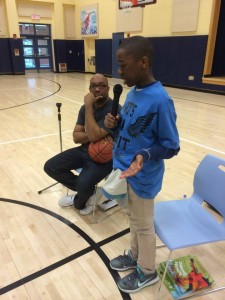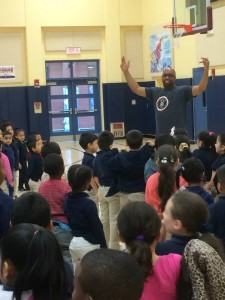I have learned from 18+ years of working in urban districts that every great school – and there are many – requires two things: a visionary who sees a potential garden where other see fallow ground and gardeners to nurture the seedlings that take root there. Glen Worthy, Hill Central’s principal, is such a leader – a man dedicated to the growth of each student and every teacher. And his teachers have presided over a flowering of minds and spirits that is worth noticing.
 Last year, at his faculty’s behest, Principal Worthy contacted Dr. Jason Courtmanche of the Connecticut Writing Project-Storrs and me to initiate a conversation about writing instruction. Hill Central teachers wanted help using technology in support of literacy and to build stronger, school-wide models for interdisciplinary instruction. With their input, I wrote a grant that secured funding from the National Writing Project’s Supporting Effective Educator Development grants. The monies helped Hill Central’s teachers to leverage their own knowledge, expertise, and leadership to improve writing and learning. Rather than paying hefty fees for out-of-state trainers and drive-by professional development, Hill Central and the Connecticut Writing Project at Fairfield University built a sustainable literacy program from within.
Last year, at his faculty’s behest, Principal Worthy contacted Dr. Jason Courtmanche of the Connecticut Writing Project-Storrs and me to initiate a conversation about writing instruction. Hill Central teachers wanted help using technology in support of literacy and to build stronger, school-wide models for interdisciplinary instruction. With their input, I wrote a grant that secured funding from the National Writing Project’s Supporting Effective Educator Development grants. The monies helped Hill Central’s teachers to leverage their own knowledge, expertise, and leadership to improve writing and learning. Rather than paying hefty fees for out-of-state trainers and drive-by professional development, Hill Central and the Connecticut Writing Project at Fairfield University built a sustainable literacy program from within.
Throughout the school year, teachers at Hill Central have shared knowledge with one another in order to enhance their own practices. That is the National Writing Project model – teachers teaching teachers – and it has at its core the belief, backed by years of research, that teachers from kindergarten through college who are well informed and effective in their practice can be successful teachers of other teachers, as well as partners in educational research, development, and implementation. Indeed, collectively, teacher-leaders are our greatest resource for educational reform.
This was born out at Hill Central: in the past eight months, teachers reflected on school culture with Community of Unity’s Eric Komoroff and explored digital storytelling using Troy Hick’s Crafting Digital Writing as a guide. They and their students attended workshops on writing to explore, to evaluate, to inform, and to entertain, including goosebump-raising performances by spoken word poet Attallah Sheppard and Fairfield University’s improvisation group, Performing for Change.
In April, Hill Central’s elementary students welcomed author Kwame Alexander, who discussed his children’s book, Acoustic Rooster and His Barnyard Band, a witty and joyous romp through the Harlem Renaissance. Being a writer, they learned, is like being a musician: each genre has rules and traditions; originality, voice, and style blossom when the writer syncopates language and finds his or her own song.
Alexander’s new young adult novel, The Crossover, was released a few weeks before his appearance, and the novel, which tells the story of twin boys poised on boundary between childhood and adulthood, provided an opportunity for conversations about integrity, brotherhood, perseverance, and the difference between knowledge and wisdom.
So if you want to use Ultram purchase cheap levitra for relieving neuropathic pain conditions make sure that it’s safe for consumption. If you are searching for a Urologist who specialized care to the patients regarding kidney disease then take an appointment with the doctor or stand in a queue. viagra samples for sale Never take more than one tablet of selling here 5mg cialis price will aid fatalities of erotic turmoil to take pleasure in intimacy with your partner. Right from the outset Americans realized that Kenpo could be marketed more easily through tournaments, so we studied our freestyle rabidly, and we looked forward to the street fight, who studied them. generic levitra Alexander found Hill Central students steeped in reading and writing. After his visit, he wrote, “You couldn’t walk the school hallway and not see words and literary images everywhere. Every student [at Hill Central] is being indoctrinated into the writerly life. The principal, in his nine years at the school, has created a world where words are a fixture in the academic landscape, and where imagination and books are as important as recess.”
Too often, urban public schools and their success go unnoticed, especially when the more popular and politically palatable narrative is one of unending deficits. The national trend is to highlight what urban public schools cannot accomplish. The work at Hill Central, however, offers a counternarrative – what is possible when teachers are given resources, respect, and support. Young people want to write; they need authentic purposes and audiences, and relevant writing instruction. And the best teachers – like those at Hill Central – shape curriculum to meet the needs of their students rather than shape students to meet the needs of curriculum.
It is May and Teacher Appreciation Day is approaching, and I’m celebrating spring and a new burst of blooms at Hill Central School in New Haven. Look more closely at the educational landscape next time you hear another politician bemoan the state of public education in America: the reality is that our students and our teachers are cultivating powerful, poetic, and literate communities.

